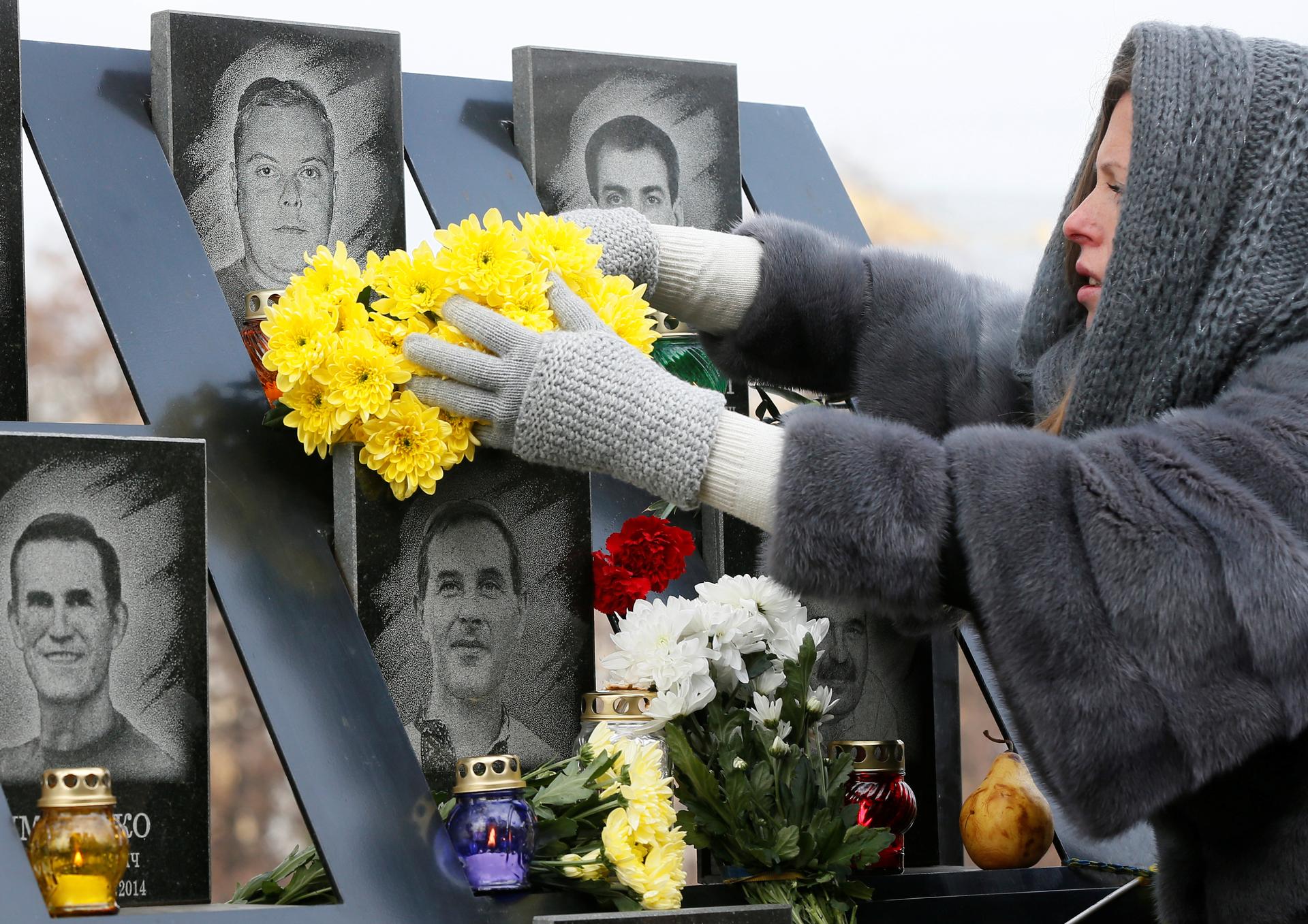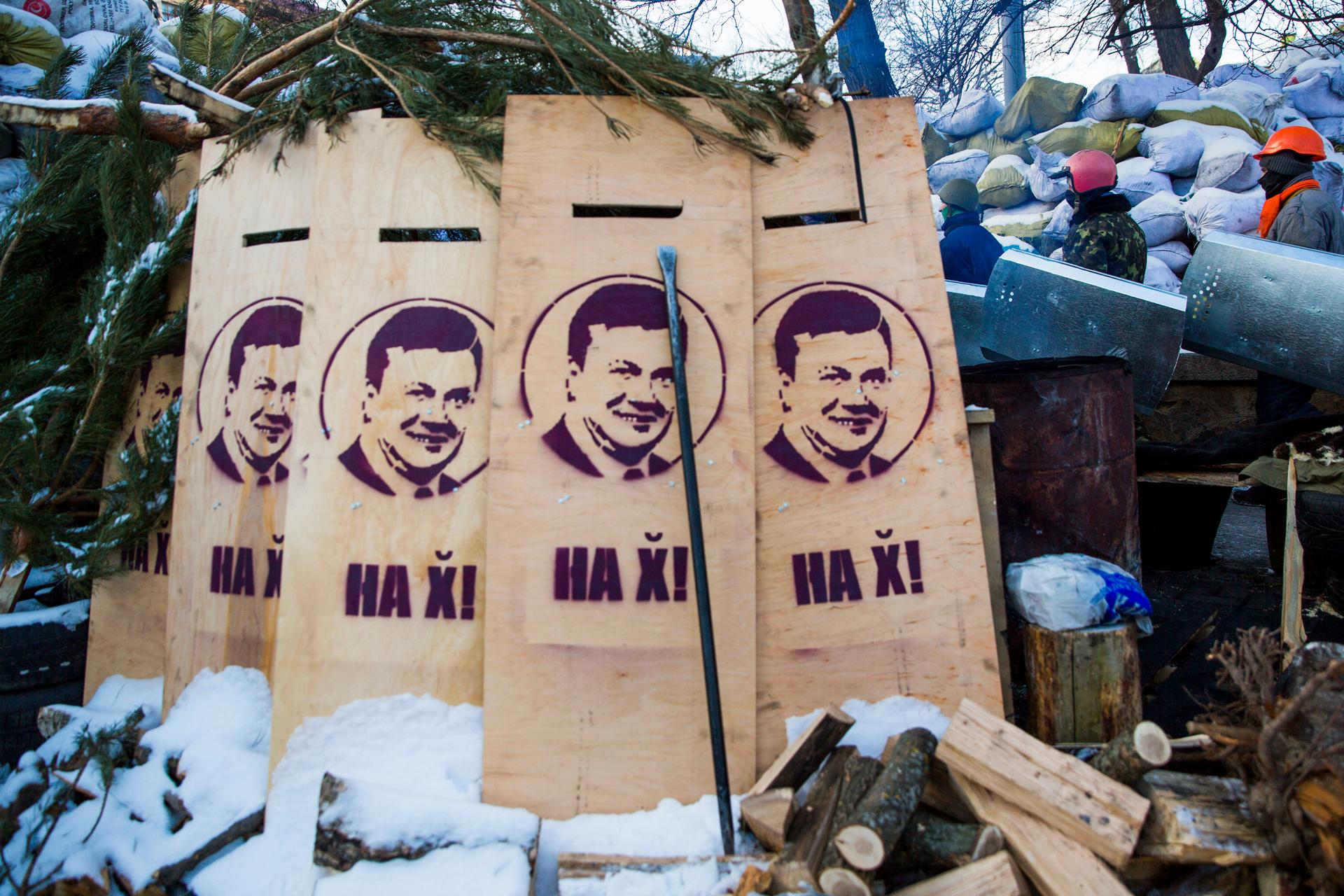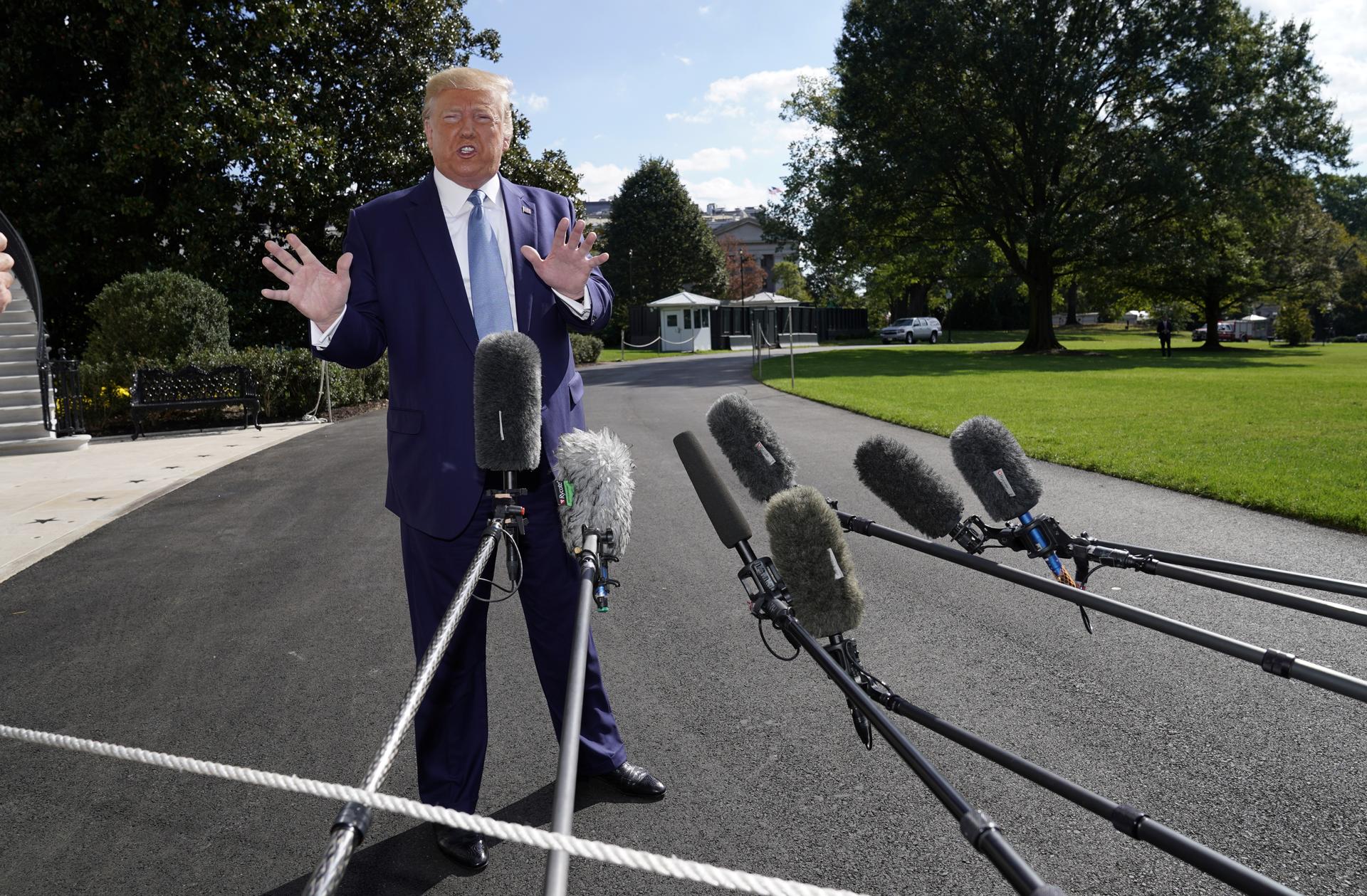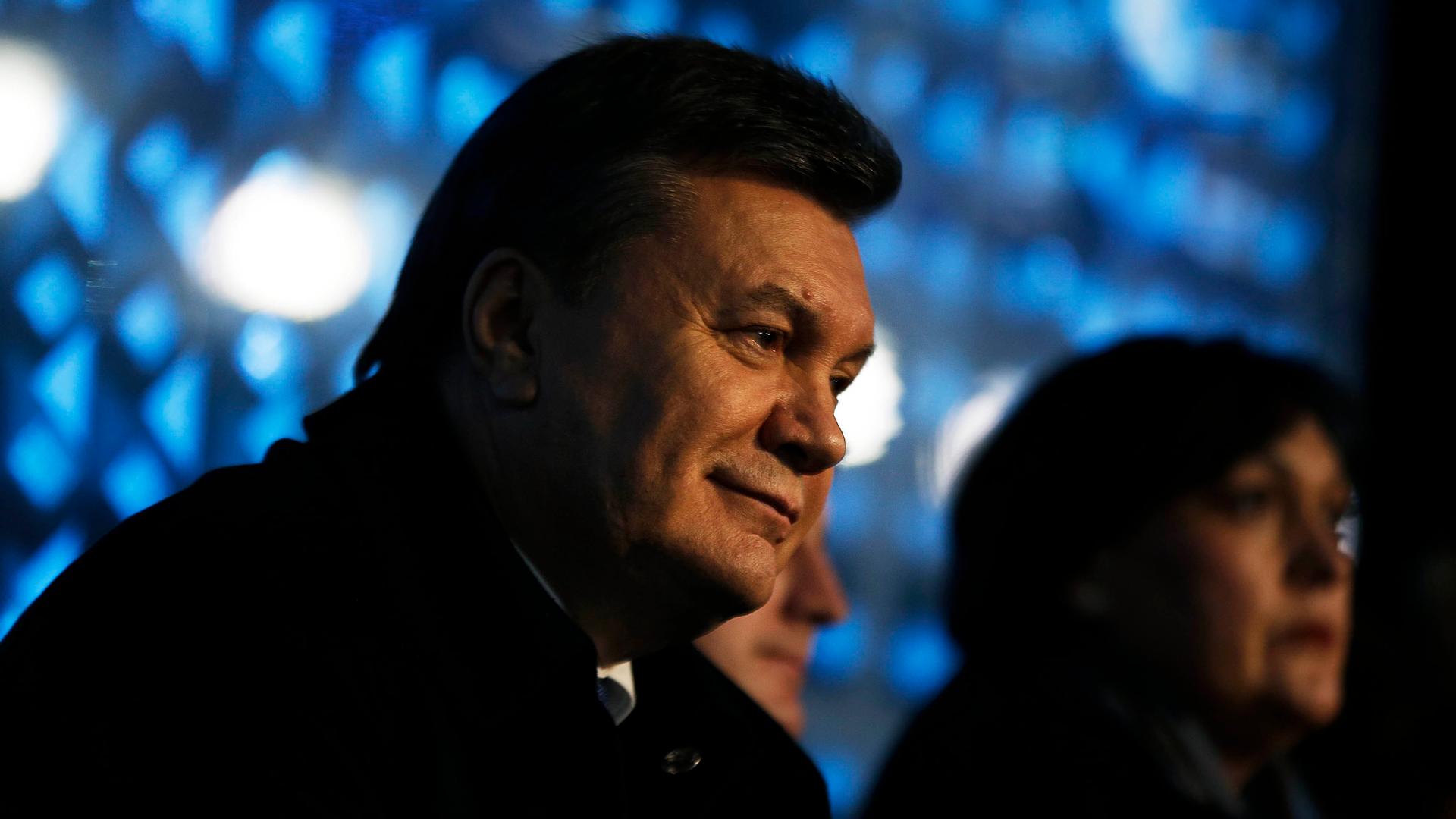Ukrainian President Viktor Yanukovych watches the opening ceremony of the 2014 Winter Olympics in Sochi, Russia, on Feb. 7, 2014, while Euromaidan protests continued in Kyiv, Ukraine. Yanukovych was convicted of treason and other crimes in January 2019.
It’s been more than a half century since the United States last convicted a citizen of treason. Almost never has the US charged an elected leader with the crime.
But another country has convicted one, as recently as this year: Ukraine.
In January of 2019, former Ukrainian President Viktor Yanukovych was convicted of high treason and other crimes for attempting to quash 2014 pro-European protests and inviting Russian military intervention on his behalf.
“Yanukovych was popular enough to have won a presidential election in 2010 and he was unpopular enough to run for his life in 2014,” said Monica Eppinger, an expert in Ukrainian politics and justice at St. Louis University.
The depth of Yanukovych’s crimes and corruption — illustrated vividly by his opulent mansion near Kyiv — were shocking betrayals of the Ukrainian state. Were the ex-president to return today, he would face 13 years in prison for his conviction.
Related: 26 things found in Yanukovych’s compound that made him look even worse
The corruptions of Yanukovych’s Ukraine are not a direct parallel for the impeachment inquiry into US President Donald Trump, who is facing an investigation into a conversation with Ukraine’s current president, Volodymyr Zelenskiy. But as Trump takes to Twitter to defend himself and has accused Democratic leadership of — yes — treason, the story of the rise, fall and conviction of Yanukovych is a cautionary tale of democratic decline.
Yanukovych’s ‘heinous acts’
Yanukovych’s abrupt decision to move away from European integration sparked the Euromaidan protests that led up to Russia’s invasion of Ukraine and annexation of Crimea in 2014. In November 2013, Ukrainians in the Maidan were exercising their right to political protest. By February 2014, lethal force was used against protesters, killing more than 100. That month, Yanukovych fled the country to exile in Russia, leaving behind massive evidence of corruption, embezzlement and abuse of power.
In a March letter, Yanukovych appealed to President Vladimir Putin “with a request to use the armed forces of Russia to restore legal authority, peace, order and stability” — in some readings, inviting a Russian military intervention to restore him to power.
“What he did in power and what he did during the events in Kyiv in late 2013 and especially in early 2014, and then what he did after he left Kyiv were were seen as pretty heinous acts,” said Paul D’Anieri, an expert on post-Soviet politics and professor at UC Riverside. “There was a desire to charge him with something that in people’s eyes matched the level of his transgressions, and treason was that thing.”

Yanukovych had been widely accused of rigging the 2004 elections, in which he was backed by Putin — which led to the Orange Revolution in Ukraine. His political affiliation, the Party of Regions, was a hub of Ukrainian kleptocracy, allegedly stealing billions from state coffers.
On the party’s payroll? Paul Manafort, who helped Yanukovych win in the 2010 elections. (Later the chairman of the Trump campaign, Manafort is one of the major figures to fall in the course of Special Counsel Robert Mueller’s investigation. He is serving a 7-1/2-year sentence for eight felony counts for fraud, connected to his work for Yanukovych’s political party.)
Yanukovych has often been described as a puppet of Putin, but while there are deep links between the two strongmen, D’Anieri says the relationship is more complicated than that.
“There’s a lot of evidence that from the time he became president, he had a very difficult relationship with Putin, which is to say he was not Putin’s lapdog,” D’Anieri said. “He was trying to pursue this very difficult course between winning Russian support and winning the West’s support, and retaining his popularity in Ukraine, all the while while becoming making sure that his rule in Ukraine was uncontested.”
Corruption and democratic erosion
Under Yanukovych, “corruption was a tool for building authoritarianism,” D’Anieri said.
While resisting Putin’s threats of fomenting economic crisis leading to political downfall, Yanukovych was trying to become the Ukrainian version of the Russian leader, D’Anieri said — amassing political and economic power to the point at which no one could challenge him.
Fear of such an erosion of democracy and accountability, Eppinger said, is part of what pushed Ukrainians to protest on the Maidan leading to Yanukovych’s ouster — and treason conviction.

Much like the US system, Art. 111 of the Ukrainian constitution provides for impeachment proceedings. But because Yanukovych fled the country, the Ukrainian Rada, or parliament, voted to remove him from power under a different article of the law that didn’t investigate his crimes.
The criminal case against Yanukovych, which was initiated in 2017 — three years after the ex-president fled the country — was a way for Ukrainian society to reckon with his culpability and was part of “post-Maidan accounting,” Eppinger said.
It was symbolically important, D’Anieri added.
“For people who suffered under his regime or for people whose loved ones were hurt in the protests or for people who care about what’s happened to Ukraine since then, to have the person responsible convicted of a serious crime is important,” D’Anieri said.
Yanukovych’s trial filled the same need that war crimes trials conducted by the International Criminal Court do, for example.
“There’s an important sense of justice being served there.”
Enter Zelenskiy, Ukraine’s pick to root out corruption
Ukraine’s current comedian-turned president, Volodymyr Zelenskiy, won in this year’s election against incumbent Petro Poroshenko with 70% of the vote. Tackling corruption — and ending the war in Eastern Ukraine — were major campaign points. But rooting out corruption will not be an easy task for the political novice who had played president on TV.
“Once corruption gets entrenched, it’s very difficult to get rid of, which I would say is a warning for for this country, as well as for Ukraine.”
“The leaders that replaced [Yanukovych] have been much less authoritarian. But the corruption has persisted,” D’Anieri added. “Once corruption gets entrenched, it’s very difficult to get rid of, which I would say is a warning for this country [the US] as well as for Ukraine.”
Ukrainian corruption has a direct tie-in to the impeachment inquiry sparked by Trump’s July phone call with Zelenskiy, in which Trump asked the Ukrainian leader to “do us a favor though.”
The White House is under fire for holding up military aid to Ukraine and has since said it was concern over Ukrainian corruption — not a quid-pro-quo for an investigation into Trump’s political rivals — that was the basis for their decision to block the funds.
The potential to lose US support as Ukraine continues to fight the war against Russian aggression is extremely concerning to Ukrainians.
“This idea that the United States would throw Ukraine under the bus because of this desire to dig up dirt on an opponent is basically saying that the United States doesn’t really care much one way or the other what happens to Ukraine, and that is very worrying to people in Ukraine,” D’Anieri said.
Related: As US focuses on impeachment, Ukraine worries about Russia
‘Arrest for Treason?’
Since the whistleblower complaint that kicked off the impeachment inquiry, Trump has railed at his opponents on Twitter and in long, rambling press conferences calling the Zelenskiy phone conversation “perfect” and accusing Democratic leadership of improper behavior.
On Tuesday, the White House announced that it would not participate in the impeachment inquiry, which it called “illegitimate.”
Related: White House says it will refuse to cooperate with impeachment inquiry
Treason is one of the grounds for impeachment in the US, but current evidence does not suggest that Trump has committed any act that would hold up to that charge, said University of Michigan law professor Richard Primus, who warned against loose use of the term.
“I don’t think that we should be quick to classify actions as treasonous, even if they are criminal, damaging, revolting unless we’re really, really sure,” Primus said. “Treason is a highly explosive allegation. There’s a reason the framers defined it narrowly.”
That has not stopped the president from making treason accusations himself. Included in a volley of profanities and name-calling, the president suggested that Rep. Adam Schiff, chairman of the House Permanent Select Committee on Intelligence, House Speaker Nancy Pelosi, and the whistleblower, whose complaint launched the impeachment probe, have committed treason.
Those accusations are “irresponsible,” Primus said. There is no evidence they have done anything criminal, much less treasonous.
“What we see is a very strange situation where you have a president accusing his political enemies of the highest crime known to the law — capital crime — in circumstances where that’s clearly grossly inappropriate,” said UC Davis law professor Carlton Larson.

How treason works in the US
A treason accusation in the US comes with a purposefully high legal bar. To prove treason — the punishment for which can range from five years in prison and a $10,000 fine to death, according to US Code — two witnesses must bear testimony to the same overt treasonous act. In the history of the US, only a handful of cases have been tried, and many convictions have been overturned or had reduced sentences.
But Trump’s rhetorical use of the term indicates that the president does not understand the legal burden of proof, Larson and Primus say — nor the distinction between criticizing the president, and betraying the state.
“He seems to have an understanding of [treason] as anyone who disagrees with him, anyone who questions him, anyone who acts in any way contrary to his own personal self interest has somehow committed treason,” said Larson, whose book on the subject was just published. “[It] is almost monarchical. If you sort of think back to the old English law, treason was … really a personal betrayal of the king. But of course that’s not what American law says.”
The American Colonies’ break from Britain during the Revolutionary War directly informed the framers of the Constitution, who sought to avoid the use of treason as a political weapon, Primus said. “They wanted critics of the government and critics of the president to be able to articulate their opposition without worrying about being prosecuted for treason.”
While Trump’s adversaries — and Trump himself — are unlikely to actually be charged with treason, the president’s inflammatory usage of the word may have other consequences, even the potential for violent civil conflict, Primus warned.
“To this point, the treason language that’s being thrown around is rhetoric and it’s overheated. The danger is that people in the public will take it seriously.”
“To this point, the treason language that’s being thrown around is rhetoric and it’s overheated,” Primus said. “The danger is that people in the public will take it seriously.”
The democratic norms that have traditionally governed the United States — norms that the Trump presidency has eroded — are part of what has drawn Ukraine to look to the US as a guiding light in the past, both as a model for democratic development and a partner in security. The current scandal dims that light.
“The irony of what the United States is preaching in Ukraine over the last 25 years and what’s going on right now is not lost on [Ukrainians],” D’Anieri said. “When we exported democracy, it came back to us in a different form. It was hybridized and returned. Like when we sent rock ‘n’ roll to the United Kingdom. The Beatles brought it back and it wasn’t the same.”
The Trump and Yanukovych situations are far from analogous, but there are significant parallels between what is happening in the US and what has happened in Ukraine, experts say.
“They are both people who try to use the power of the civil branches of government for political purposes,” D’Anieri said. “The idea that every bureaucrat from the top to the bottom is working for the [US] president’s party — that’s something that was very normal in Ukraine under Yanukovych, even if people resisted it.”
Trump’s bold assertions of presidential powers and immunity, which were dealt a legal blow this week, also have eerie autocratic echoes.
“I am one of those people who thinks that the United States is becoming more like Ukraine not less over time,” D’Anieri added.
“Democracy depends on accountability.”
While the situations are not the same, both the Yanukovych trial and the Trump impeachment inquiry is a lesson for the democractic system, Eppinger said.
“The biggest takeaway point that came to my mind was that democracy depends on accountability,” she said.
Holding elected officials to account — that’s one thing elections, protests and investigations do have in common.
